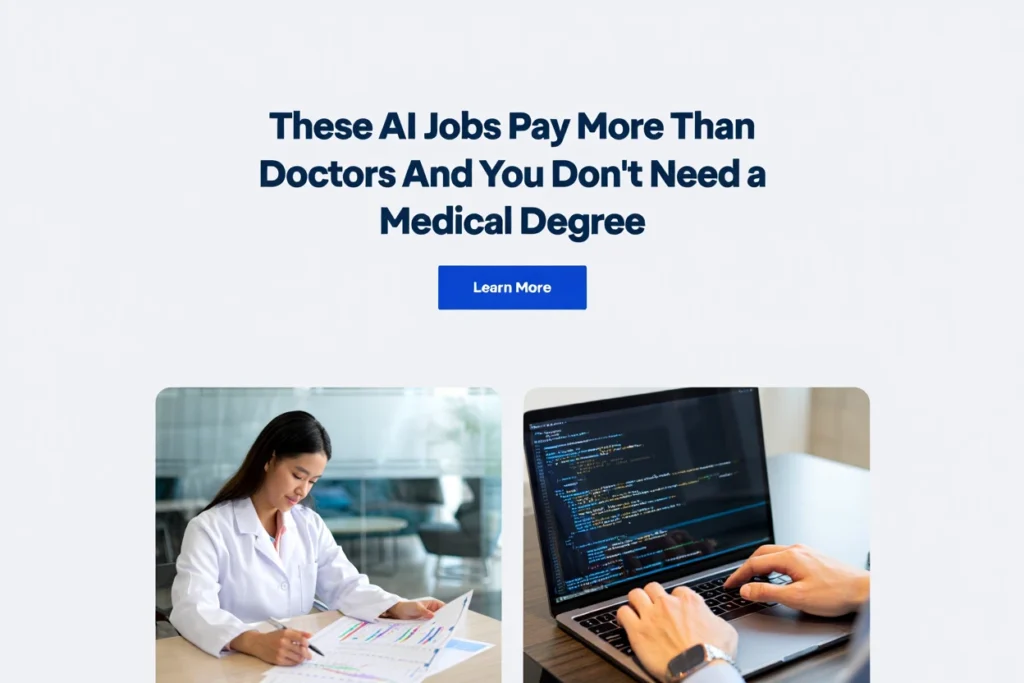When Coders Overtake Consultants
Imagine you’re scrolling through the news, half-awake with a coffee in hand, when you stumble across a headline that reads: “AI engineers now earning more than doctors in the UK.”
You pause. Did you read that right? No medical degree. No 12-hour hospital shifts. No residency. Yet coders are stacking salaries that rival some of the best-paid consultants.
Deepak Shukla, founder of Pearl Lemon AI, jokes: “When I told my cousin, an anaesthetist, that writing code for AI models now outpaces their hospital paycheck, they nearly dropped their syringe.”
It sounds absurd, but in 2025, it’s not. AI specialists across the globe, and especially in the UK, are commanding salaries that can equal or even surpass what many seasoned doctors make. And unlike medicine, you don’t need to sacrifice 12 years of your life to training before the big money rolls in.
The Numbers Game: AI vs Medical Salaries
Let’s start with the raw comparisons.
In the UK, entry- to mid-level AI engineers earn an average of £53,982 per year, with those in the top quartile making around £62,150.
By the time you reach mid-senior levels in high-demand niches such as natural language processing (NLP) or machine learning operations (MLOps), salaries stretch comfortably into the £70,000–£120,000+ range. Some even top that with bonuses and stock options.
Contrast that with medicine. A Foundation Year 1 doctor starts on roughly £32,000, rising to about £37,000 in Foundation Year 2. Specialty Registrars, the doctors training to become consultants, earn between £52,656 and £73,992 in basic pay, with allowances pushing their total nearer £80,500.
Consultants, the most senior hospital doctors, earn a base salary of between £105,504 and £145,478, with extras taking their total closer to £161,600. Meanwhile, GP partners—who essentially run their own practices, earn an estimated £163,500 annually, while salaried GPs average around £108,300.
Now zoom out globally. At Microsoft, senior AI roles in the US can command packages worth up to $377,000 a year, dwarfing what many medical specialists earn, even in private practice. And in the UK alone, the AI industry is worth over £21 billion in 2025, with forecasts suggesting it could surpass £1 trillion by 2035.
The result is that the mid-career AI professionals are already out-earning many doctors, and they’re doing it much earlier in their careers.
Why the AI Premium Exists
So, why are AI roles suddenly in the financial stratosphere?
First, there’s talent scarcity. Qualified AI professionals are rare, and companies compete ferociously for their skills.
Second, AI creates immediate ROI. Unlike many roles that support or sustain operations, AI drives direct business value: cost reductions, efficiency gains, and entirely new revenue streams.
Third, there are the perks. AI jobs aren’t just about headline salaries. They’re nearly three times as likely to include remote working options and twice as likely to offer enhanced parental leave. Benefits like tuition reimbursements, flexible hours, and healthcare support can add 12–20% in effective value on top of the base pay.
Deepak frames it simply: “Doctors save lives, and that’s noble. But AI saves companies time, money, and mistakes. To a CEO, that’s priceless, and they’ll pay accordingly.”
Training Timelines: Fast Track vs Marathon
This is where the contrast gets brutal.
Becoming a doctor in the UK means:
- 5–6 years at medical school,
- 2 years of foundation training,
- 5–7 years of specialist training before consultant status.
In short, around 12–15 years before you’re earning at the top end. And that’s after surviving student debt and punishing work hours.
AI professionals, meanwhile, often find themselves in high-paying roles within 3–5 years. Some skip traditional degrees altogether, opting for coding bootcamps, online certifications, or self-driven portfolios that land them lucrative roles far sooner.
Deepak laughs: “You don’t need to memorise the Krebs cycle to get rich. You need to know how to wrangle data pipelines and frankly, it’s faster, cheaper, and involves fewer 4am emergency calls.”
Workforce Shifts and the UK Reality
The implications are big.
- Students are pivoting: Where medicine was once the secure, prestigious path, more students are choosing computer science, data science, and AI-related degrees.
- NHS pressures remain: The UK’s healthcare system faces chronic staff shortages, partly because pay hasn’t kept up. In fact, real-term NHS doctor pay has fallen between 4–10% since 2010–11, even as demands have risen. Junior doctors continue striking for fairer pay.
- Hybrid careers are emerging: Professionals outside of tech: marketers, analysts, even nurses are retraining in AI to future-proof their careers and boost earnings.
Roadmap to AI Riches
So, what does it actually take to break into this booming field?
- Learn the foundations: Python, machine learning frameworks like TensorFlow or PyTorch, and statistics.
- Build a portfolio: Show your skills on GitHub, Kaggle, or through freelance projects. Employers love real work over polished CVs.
- Find your niche: Whether it’s computer vision, natural language processing, or MLOps, the more specialised you are, the higher your earning potential.
- Network: Attend AI meetups, conferences, or join online communities. Opportunities often come through connections.
- Negotiate the full package: Many AI jobs come with bonuses, stock options, or profit sharing. Salary is just the starting point.
Beyond the Paycheck: Ethics & Responsibility
Now, here’s where it gets serious.
Yes, AI is lucrative. Yes, it’s transforming industries. But money isn’t the only consideration.
- AI won’t replace doctors: We’ll always need people to diagnose, treat, and care. AI is just another impactful path.
- Ethics matter: The same algorithms that optimise logistics can also entrench bias if not designed responsibly.
- Equity is vital: Training opportunities in AI must remain accessible, or else we risk creating an elite tech class while leaving others behind.
Wrapping Up: Two Paths, One Choice
So, where does that leave us?
AI jobs are no longer the nerdy niche, they’re mainstream, highly paid, and reshaping the way ambitious professionals plan their futures. Doctors still hold prestige, societal value, and the privilege of saving lives. But AI engineers are now competing on earnings, flexibility, and speed to financial independence.
Deepak Shukla puts it best: “You can cure, or you can code cures. One takes longer, one pays sooner, but both matter. If speed, freedom, and earnings are your scoreboard, AI’s the sharpest play right now.”
For students, mid-career professionals, or even doctors eyeing a pivot, the choice has never been more interesting. AI isn’t replacing medicine, but it is redefining what a high-earning, high-impact career looks like in 2025.
References
- UK AI Engineer average: £53,982; 75th percentile £62,150 (salary.com)
- AI Engineer mid-senior: £70,734–£125,750 (theknowledgeacademy.com)
- Junior doctor salaries: £32,398–£37,303 (themedicportal.com, consultingtimes.com)
- Specialty Registrar salaries: £52,656–£73,992 base; ~£80,500 total (nuffieldtrust.org.uk)
- Consultant doctors: £105,504–£145,478 base; ~£161,600 total (nuffieldtrust.org.uk)
- GP salaries: £163,500 (partners); £108,300 (salaried) (nuffieldtrust.org.uk)
- NHS doctors’ real-terms pay fell 4–10% since 2010–11 (theguardian.com)
- NHS strikes context (theguardian.com, en.wikipedia.org)
- Microsoft AI salaries up to $377,611 (windowscentral.com)
- UK AI industry valuation: £21B in 2025, projected £1T by 2035 (en.wikipedia.org)
- AI perks and pay correlation (arxiv.org)




